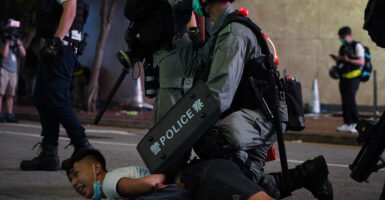On June 30, China imposed a so-called national security law that sparked protests across Hong Kong. How is this “national security law” impacting Hong Kong’s relationship with the U.S.? As a global financial center, how is this law hampering Hong Kong’s influence? Mike Gonzalez, author of the forthcoming “The Plot to Change America: How Identity Politics is Dividing the Land of the Free” and a senior fellow in the Douglas and Sarah Allison Center for Foreign Policy at The Heritage Foundation, joins the podcast to discuss.
We also cover these stories:
- Jobless claims are surging as the coronavirus pandemic continues.
- Michael Cohen, a former lawyer for President Donald Trump, is set to be released from prison.
- Rep. Alexandria Ocasio-Cortez of New York says the Republican Party has a “culture” of sexism.
“The Daily Signal Podcast” is available on Ricochet, Apple Podcasts, Pippa, Google Play, and Stitcher. All of our podcasts can be found at DailySignal.com/podcasts. If you like what you hear, please leave a review. You can also leave us a message at 202-608-6205 or write us at letters@dailysignal.com. Enjoy the show!
Rachel del Guidice: I’m joined today on The Daily Signal Podcast by Mike Gonzalez, he’s a senior fellow at the Douglas and Sarah Allison Center for Foreign Policy at The Heritage Foundation. Mike, it’s always great to have you on The Daily Signal Podcast.
Mike Gonzalez: It’s always great for me to be on and speak to your audiences.
Del Guidice: Thanks so much for making time to be with us. On June 30, and we talked about this, actually, a few months ago before this national security law passed, but Hong Kong passed a so-called national security law that sparked protests across that region. What has changed in Hong Kong since the implementation of this law?
Gonzalez: Well, a technical correction, it was China that passed it, and that is part of the problem. China completely ignored the promise that it had made Hong Kong of granting it autonomy. And the National People’s Congress just passed a national security law that applies to Hong Kong and which Hong Kong cannot have a judicial review of it. So the law is in the books and now Hong Kong really is part of China.
The national security law says that if you’re guilty of sedition, then you’re guilty of this law, the law finds you guilty. And you can actually be even tried in China, or you can be … that part is not really clear yet.
But the fact is that the natural rights, the rights that Hong Kong people were promised in the Sino-British [Joint] Declaration signed in the ’80s that they would have a large degree of autonomy have been violated.
So look, … it means several things. Countries around the world are finally waking up to this. The U.K., Australia, and Canada have suspended their extradition treaties with Hong Kong.
That means that if the government of Hong Kong, which is really a nominal government, increasingly, asks for the extradition of somebody in Canada or the United Kingdom or Australia, that person won’t necessarily be extradited to Hong Kong because these governments do not think that the law will … treat them fairly.
Also, the AmCham, the American Chamber of Commerce in Hong Kong, took a survey very recently of American expats. There’s 1,200 companies, American companies in Hong Kong and half of them are thinking of leaving. This is a blow to Hong Kong.
It’s a sad thing to see because Hong Kong, as you well know, was such a successful city, such a successful capitalist city, was No. 1 in The Heritage Foundation Index of Economic Freedom for two decades—until this year in fact, when it dropped [to] No. 2. So Hong Kong is now just becoming another city in China.
Del Guidice: That’s actually my next question, which you mostly hit on, but just given that Hong Kong has been such a global financial center, how is this going to impact that area for the time being to come given that they’re not going to have the success that they’ve had in the past?
Gonzalez: Well, I mean, it will be people’s flight. The U.K., the relationship with the U.K. with Hong Kong, it goes back, obviously, for a century and a half. Britain used to be the colonial power until 1997. And the U.K. has just said that 3 million people—that’s roughly about half of Hong Kong, Hong Kong is about 7.2 million people—3 million people in Hong Kong will have the right of abode in the U.K. if they so choose.
The United States, in a executive order issued by [President Donald] Trump last week, also said that it would consider issuing some Hong Kong people refugee status.
So there’s going to be a people flight. There’s going to be a brain drain and there’s going to be a capital drain.
I keep hearing stories of people pulling their money out of Hong Kong. U.S. companies are leaving. A brain drain is an awful thing on a territory, whether it was Northern Ireland during the Troubles in the ’60s and ’70s or Cuba after the Cuban Revolution, all the professionals empty out and leave.
It can cripple an economy. And if it’s combined with capital flight, for what has been a banking center, this is really, for somebody like me who’s lived in Hong Kong for eight years, who knows Hong Kong really well, that this is happening to such a jewel of a world city, one of the best cities in the world by any standard, it is really sad.
And it’s all the fault of the Communist Party in Beijing. It did not need to do this. It did not need to take this draconian measure. In fact, it violated the word that it gave to the United Kingdom into the world.
The Sino-British Joint Declaration is an international treaty entered into the United Nations. In it, China, the government of China, the PRC, the People’s Republic of China, that is the Communist Party of China, gave its word that it would respect Hong Kong autonomy. It’s now violated that.
Del Guidice: Mike, as you mentioned, you’ve spent nearly a decade living in Hong Kong. What have you been hearing from folks on the ground there about what’s changed under this new law? Have you’ve been hearing any sort of conversations or even just seeing things in their news coverage? What are you hearing?
Gonzalez: It’s the same thing as is reflected in the survey taken by AmCham. People are very worried, expats and Hong Kongers alike. Hong Kong belongers is what we used to call them. Hong Kong belongers and expats alike are expressing a great deal of apprehension about the fact that their rights were no longer be protected.
What this law says, that anything you say or utter can be considered seditious and thereby you can be charged with a crime right there, your freedom of speech has [been] taken away. Your freedom of association has [been] taken away. Your freedom of conscience, really, is the next one to go.
People are thinking of leaving. As I said, people are pulling their money out. People are concerned about remaining there and what it means to their livelihood and the U.S. government.
The secretary of state, Mike Pompeo, who … just landed in the U.K. last night to discuss this very issue with his counterpart in the U.K., Dominic Raab, and hopefully with his other counterparts in the Continent.
There needs to be a joint response by all the democracies, all the freedom-loving peoples of the world, to say to the Communist Party of China, “You really can’t do this. If you violate your word here, your word will be meaningless on everything else you say. We will not respect you.”
They care a lot about being respected in the world but the truth about the true nature of the Communist Party of China is now becoming known to the world and that fills these old men in the Politburo with fear and rightly so.
Del Guidice: Fox News reported on Monday that the British government suspended its extradition arrangements with Hong Kong due to this controversial national security legislation being imposed by Beijing. What does this mean for the U.K.’s relationship in specific with Hong Kong?
Gonzalez: Actually, I’m pleasantly surprised that the U.K. has finally taken such a leading role. It used to be said that the U.S. took the lead and the U.K. just allowed anything to happen to Hong Kong after it left. It has been different with Boris Johnson, the prime minister of the U.K. for the last year.
He has taken this much more seriously than his predecessors, his responsibilities, Britain’s responsibility toward his former colonial subjects, the 7.2 million people of Hong Kong.
And this policy that you mentioned of deciding to seize, to put a stop to the extradition treaty, to suspend it rather, it is a major decision that the Chinese Embassy in London has issued a very strong condemnation of it, which means it is hurting them.
The PRC, the People’s Republic of China, through its Embassy in London has said to the U.K., “We don’t interfere in your internal affairs, do not interfere in ours. Whatever happens in Hong Kong is our internal affairs.” But that is not the case.
It is not the case because … again, China signed a treaty with Britain in the ’80s called the Sino-British Joint Declaration, in which China’s Communist Party gave its word, China’s communist rulers gave their word that they would respect the autonomy of the people of Hong Kong for 50 years after it took over Hong Kong in 1997, that would be, obviously, 2047. We’re not there yet.
So, the fact that it is not valid, that it is that halfway through this period has decided it can no longer abide by its word is very worrisome.
Del Guidice: What is China’s big-picture aim in this crackdown on Hong Kong?
Gonzalez: … With [China’s] ruthless oppression of the Uighurs in Xinjiang—Xinjiang is a region in the west that is peopled by a Turkish-speaking, mostly-Muslim people called the Uighurs. And China … now finally admits that it has opened concentration camps and that it is putting hundreds of thousands of Uighurs through concentration camps and reeducation camps. And China has done similar things in Tibet, obviously, since taking over Tibet in 1959.
China says, now, “If I take over, I can do anything I want.”
Communism is always ruthless because it violates the common humanity of people and violates a natural law. So to do that, it must use coercion and violence, and it does so inexorably.
What this says to the people of Taiwan is don’t ever, ever, ever trust the word of the Chinese Communist Party in Beijing.
As long as China, the mainland China, continues to be ruled by the Communist Party, the people of Taiwan … have now been warned that one country, two systems for Taiwan will not be respected, and they will be oppressed just as the people of Hong Kong are being oppressed, just as people in Xinjiang are being oppressed, just like the Tibetans are being oppressed
Del Guidice: Before this law was enacted, national security adviser Robert O’Brien suggested the U.S. might consider sanctions against China if it goes forward with this law. … What is your perspective about how the U.S. has responded? Has our response been adequate? And what else would you suggest the United States do?
Gonzalez: Yeah, it has been adequate, the Trump administration has been rather good on this.
As I said, Secretary Pompeo has informed Congress that it no longer considers Hong Kong autonomous, that means that the special nation status, the special trade status that Hong Kong receives may be waved away now, it may be that for trade purposes, Hong Kong will be considered just another city in China.
We will see whether the Global Magnitsky Act is applied to PRC and Hong Kong officials who are identified as having taken a direct personal action in suppressing the rights of the people of Hong Kong.
So that has not happened yet, but if any Hong Kong or Chinese official is identified as having personally been involved in denying the people of Hong Kong the right to free speech on this sedition technicality, then they can be sanctioned. They and their families can be sanctioned. And that can be not being allowed to … be given a U.S. visa and as far as having their U.S. assets frozen.
So, the U.S. has done already a lot, there’s more than can be done. And I’m sure Secretary Pompeo, who is surrounded by some really smart people when it comes to Hong Kong, I can think of at least two officials who know a lot about this area, know a lot about this policy, and they’re giving very good advice to the Trump administration, which is why the Trump administration is doing all the right things.
Del Guidice: In the beginning, you mentioned how there’ve been protests in the region before this law was enacted. What does this mean now for freedom fighters in Hong Kong on the big picture?
Gonzalez: Well, this is when the rubber will hit the road. They will either stay and be courageous, and if they do that and they continue to speak out, they will likely land in a prison with long prison sentences. For somebody like Martin Lee, who is 81 years old, that would probably mean a death sentence, because he could actually, obviously, contract COVID-19 in prison and die in short order.
They could leave. They could leave and speak out against what is happening in Hong Kong from outside. That is also a courageous thing to do. If you know that you’re going to be thrown in a prison, in a dungeon in China for exercising your natural rights, then you might decide to just leave Hong Kong while people are still allowed to leave Hong Kong and condemn what the Chinese government is doing and the Communist Party is doing from outside.
Del Guidice: Mike, thank you so much for joining us today on The Daily Signal Podcast and breaking this down. We appreciate having you with us.
Gonzalez: Great. Thank you very much for having me on, as always.





























